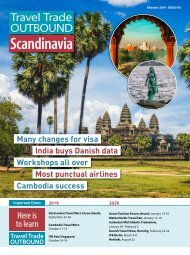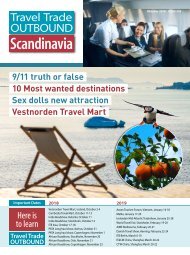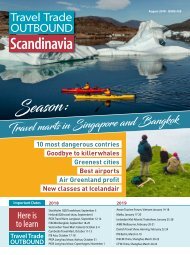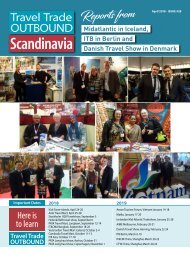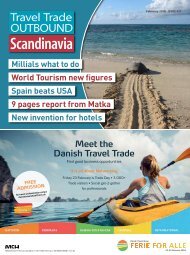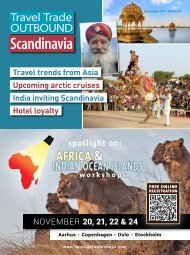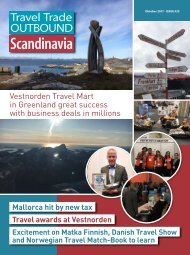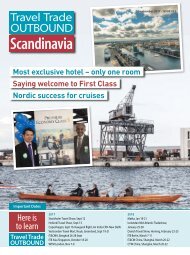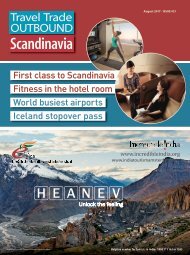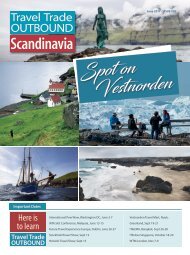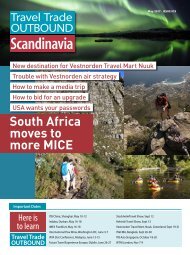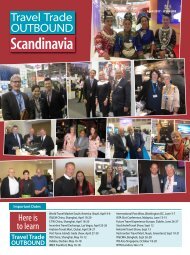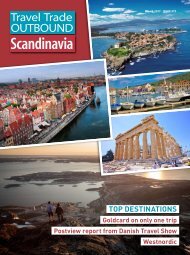tto_nov_1-28_final
You also want an ePaper? Increase the reach of your titles
YUMPU automatically turns print PDFs into web optimized ePapers that Google loves.
Thomas Cook with<br />
new strategy<br />
Travel giant Thomas Cook with 22 million<br />
customers and sales of around 10 billion<br />
Euros are working with a new strategy of<br />
creating ‘one European tour operator’ with<br />
a mix of centralized production and local<br />
sales.<br />
At group level, there are now three centralized<br />
product platforms which contract<br />
capacity and create a product portfolio for<br />
local markets.<br />
1. ‘Differentiated’ beach holidays unit,<br />
based on some 2,500 own or exclusive<br />
hotels.<br />
2. ‘Long-tail’ non-differentiated holidays<br />
unit covers other mainstream holidays,<br />
city trips, self-drive holidays and dynamic<br />
packages.<br />
3. The third platform covers special products,<br />
including premium and long-haul<br />
holidays, cruises and specialist brands.<br />
As a result, the local country organizations<br />
now focus more on trading (sales & marketing),<br />
capacity and yield management.<br />
Magnus Wikner, CEO, Thomas Cook<br />
Northern Europe:<br />
“We are moving towards a more integrated<br />
approach in the whole group. Our<br />
main focus is the customer and to develop<br />
more differentiated customer offerings,<br />
e g our concept hotels. In the Nordic countries<br />
we have great experience of working<br />
in this way and we are looking forward to<br />
working even closer to each other in the<br />
group, developing our customer offer.”<br />
In Scandinavia Thomas Cook owns<br />
Ving in Sweden and Norway, Tjäreborg in<br />
Finland and Spies in Denmark with a total<br />
of 1.5 million guests, and Thomas Cook<br />
Airlines.<br />
We are moving towards a more integrated approach<br />
in the whole group, says Magnus Wikner,<br />
CEO, Thomas Cook Northern Europe.<br />
Progress<br />
“Over the last three years we have made<br />
excellent progress transforming our business.<br />
We have developed a strong core holiday<br />
proposition based around our ownbrand<br />
hotels, reduced our cost base, and<br />
strengthened our capital structure,2 says<br />
Dr Peter Fankhauser, Group Chief Executive<br />
Officer, Thomas Cook.<br />
“The next phase of transformation will<br />
aim to better integrate our businesses<br />
across geographies, with a higher quality<br />
and more focused holiday offering delivered<br />
through our New Operating Model.<br />
With the benefit of our strong brands and<br />
through our absolute focus on customer<br />
needs, I am confident that this strategy<br />
will lead to an even better holiday experience<br />
for our customers, further improving<br />
our growth and profitability, and increasing<br />
returns to shareholders.”<br />
“ISIS the<br />
biggest<br />
threat”<br />
“Terrorist organization ISIS represents<br />
the single biggest threat to travel security,<br />
now and in the future. Fighters are<br />
joining it from across the world. This<br />
increases the chance of more frequent,<br />
localized terrorist attacks when they return<br />
from the conflict. Such incidents<br />
are more difficult to detect and prevent<br />
than large-scale events, so it’s even<br />
more important to prepare and protect<br />
travelers. Companies with active travel<br />
risk and crisis management programs<br />
will be better positioned to do this,<br />
supporting duty of care commitments<br />
to their employees.”<br />
This is the forecast of the Business<br />
Travel in 2016 made of Advito, US consulting<br />
agency with headquartered in<br />
Chicago.<br />
“Aside from safety and security issues,<br />
travel in Europe is being increasingly<br />
disrupted by industrial action.<br />
High-profile strikes by unions seeking<br />
a larger share of company profits<br />
have disrupted travelers in Belgium<br />
and Germany. These could spread to<br />
other countries. Health is another issue<br />
to consider. Outbreaks such as the<br />
2014 Ebola crisis ignite fears of a global<br />
pandemic, and the global nature of<br />
travel means disruption often extends<br />
way beyond the area directly affected.<br />
For example, the Ebola outbreak mainly<br />
affected West Africa but resulted in<br />
major travel disruption as far away as<br />
Brussels Zaventem, an airport with<br />
good connections to West Africa, while<br />
it also affected travel to the U.S.<br />
Nature also remains an ongoing and<br />
growing cause of disruption. Climate<br />
change and increasing seismic activity<br />
mean more extreme and powerful natural<br />
events, which are almost impossible<br />
to predict.<br />
Attention to safety and risk is always<br />
heightened immediately after an<br />
incident, but typically fades in time.<br />
To be fully prepared, companies must<br />
think about security and plan for the<br />
worst even when risks aren’t in the<br />
news. Smart travel risk management<br />
also means understanding data security<br />
and protection requirements across<br />
global operations.<br />
Travel Trade OUTBOUND - Scandinavia




